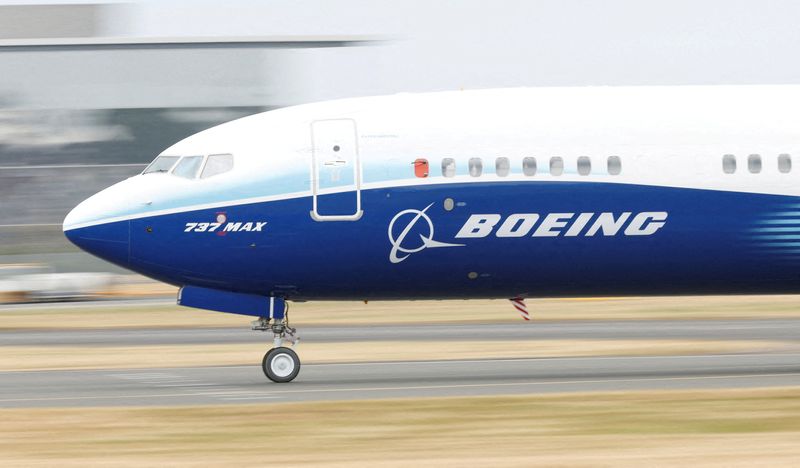By David Shepardson and Tim Hepher
(Reuters) -Boeing Co has appointed a senior troubleshooter to help turn around loss-making programs at its Defense, Space & Security (BDS) division in what some sources view as a potential template for future efforts to fix wider industrial woes.
Steve Parker, head of Boeing (NYSE:BA)'s bomber and fighter programs as well as its St Louis defense plants, has been promoted to the new role of chief operating officer for the division, which makes up almost half of Boeing revenues, industry sources said.
A Boeing spokesperson confirmed last week's appointment, which has not been announced publicly.
Parker will report to Ted Colbert, who was appointed chief executive officer of BDS earlier this year after a career mainly in IT services followed by the helm of Boeing Global Services, which provides parts and engineering for airlines and military.
The move to strengthen industrial leadership comes after delays and cost overruns blighted long-term projects for which Boeing is locked into a fixed price.
Investors and customers have expressed concerns over development and production delays across the company when Boeing is digging itself out of a safety crisis over the 737 MAX jetliner and $45 billion of net debt.
"Boeing's problems have been not exclusively but largely about execution," said Agency Partners analyst Nick Cunningham.
Chief Financial Officer Brian West said last month fixed-price defense contracts were being "knocked around" by supply chain problems, inflation and labor shortages.
In the second quarter, Boeing took $400 million in charges on programs including the MQ-25 refueling drone for the U.S. Navy and its Starliner commercial crew project for NASA.
It also faces losses on its KC-46A tanker and T-7A trainer programs for the U.S. Air Force and on new Air Force One jets.
BROAD APPROACH
Addressing the nuts and bolts of BDS is seen as significant not only because of immediate pressures but because its work on advanced new design methods is expected to shape future civil programs at Boeing Commercial Airplanes (BCA).
Finding a cure to chronic delays and readying Boeing for the developments needed to recover civil market share lost to Airbus are critical goals for group CEO Dave Calhoun whose "reputation is on the line," a senior industry official said.
The Boeing spokesperson said there were no plans to make further COO appointments.
But two people familiar with the matter said it was not excluded that Parker's new operational role might eventually open the door to similar functions at other businesses.
"It is not an isolated approach," one of the people said.
In 2006, incoming BCA chief Scott Carson appointed Jim Jamieson chief operating officer of the Seattle-based unit - a wide brief giving him effective oversight of jet manufacturing and development until his retirement about 18 months later.
Jamieson's manufacturing muscle was seen at the time as a counterweight to Carson's sales and financial background after the departure of revered jetliner chief Alan Mulally to Ford.
Those changes came just as Boeing was trying to juggle changes in manufacturing with the development of the Boeing 787, while still bearing the wounds of a 1997 production crisis.
Boeing is once again involved in a radical overhaul of design and manufacturing methods, using digital modelling rooted in the development of the T-7A military trainer.

It has deferred a possible decision on launching a pair of new civil jets by around two years amid debts and questions over the timing of new production systems and engine technology.
Airbus has long had a COO at its jetliner business though insiders note it is effectively a central corporate role because the same unit doubles as parent of the group's other divisions.